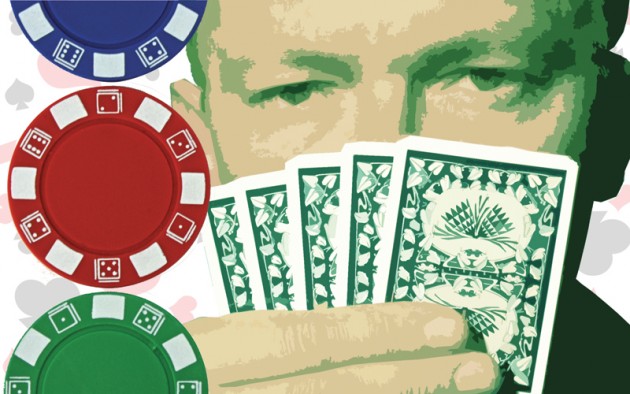Students face potential poker problems

The threat of a gambling addiction isn’t confined to casino hoppers in Sin City. A new study reports that Florida college students are twice as likely to be at risk for gambling problems as adults in the state.
The study — conducted by the Florida Council on Compulsive Gambling (FCCG) with USF’s Center for Research, Evaluation, Assessment and Measurement (CREAM) — concluded that 14.5 percent of Florida college students are at risk for gambling problems.
Between December 2007 and February 2008, 2,020 students from seven Florida universities were surveyed.
FCCG Executive Director Pat Fowler attributed the 14.5 percent statistic to the typical behavior of college students.
“At this time in one’s life, we tend to take more risks than you might at other ages,” she said.
She also attributed it to the ease of access to gambling today.
“The environment of gambling today is quite different than it’s ever been,” Fowler said. “It’s more socially acceptable and more available than it’s ever been.”
Interim Director of the Counseling Center Dale Hicks said he believes the severity of a gambling addiction is not gauged properly and is almost glorified in the media.
“ESPN has made gambling into a sport and I think many people don’t recognize that gambling can become an addiction,” he said.
Some students attribute the increase in gambling among college students to financial strain.
“I would say it’s probably true. It’s a lot harder to hold steady jobs in college,” sophomore Andrew Phillips, a finance and math major, said.
Phillips has been gambling online since the age of 12. At 18, he hit the poker tables, the only form of gambling legal at that age.
“If you’re good enough, it’s like having a job,” he said.
Phillips said he has made thousands of dollars playing over the years, including $1,200 he made the first week of summer and a couple hundred each month after. However, he has recently stopped playing because of the risk involved.
“I honestly don’t like it,” he said. “I don’t like the ups and downs of it.”
Phillips’ father was a compulsive gambler and Phillips said he saw him lose tens of thousands of dollars to the addiction.
“My dad explained to me that when you’re a compulsive gambler, nothing else matters,” he said.
As with any other addiction, compulsive gamblers make excuses for themselves that hurt them in the long run, Hicks said.
“There are a lot of justifications people can make for engaging in various behaviors. The fact is when you’re gambling, the odds are against you,” he said. “Every now and then somebody gets lucky. In the long run, the vast majority of people are going to lose money.”
Yet what students define as a problem is arguable.
“The question is what you consider a problem. There’s responsible gambling and (there’s an) irresponsible problem,” sophomore Daniel Ariew, a philosophy and math major, said.
Ariew said he believes there is a distinct buzz one experiences while gambling, no matter whether he or she is winning or losing.
“Gambling has a lot of addiction involved,” he said. “It’s the thrill of winning and the thrill of losing. Everything about it is entrancing.”
Ariew has been playing poker for a couple of months and views the game from a business standpoint.
“I have only been playing poker since last February because my roommate taught me basic strategy and I read books from there,” he said. “I see it as a way to make money, I don’t see it as a pleasure thing.”
Ariew plays poker in casinos and online about once every two weeks. In addition to what he learns from books, he said his age can inadvertently give him an edge over other players.
“As an 18-year-old, I sometimes use that as an advantage because people won’t think I’m good at poker,” he said.
Phillips said he believes playing poker is fine as long as it is done responsibly.
“The key is money management,” he said. “A lot of students don’t have that ability.”
Ariew said students should set limits for themselves and not get too caught up in the game, especially if they are doing well.
“I feel like if I play too many nights in a row, I play worse. If you’re high with winning, you’re likely to make a different judgment call. You play completely differently,” he said. “I try to play responsibly by setting limits for myself on how much I play.”
Poker seems to be particularly popular among college students, Fowler said, and many incur a “considerable amount of debt” as a result.
Ariew said he often sees this at casinos.
“I see college students playing poker and losing a lot of money,” he said. “Not many people jump into it and are good at it.”
Fowler said he believes that if students develop an addiction, they need to approach the issue as they would a drug or alcohol problem and seek help.
“Most students who gamble do it for fun and won’t develop a serious problem,” she said. “But we know there are those who are (developing problems). We encourage them to seek resources.”
The USF Counseling Center and the Center for Addiction and Substance Abuse are two such resources.
“One of the things we’re trying to educate the community about with gambling is there a lot of different addictions and students experience those addictions just as much as anyone in the community, if not more,” Hicks said.






